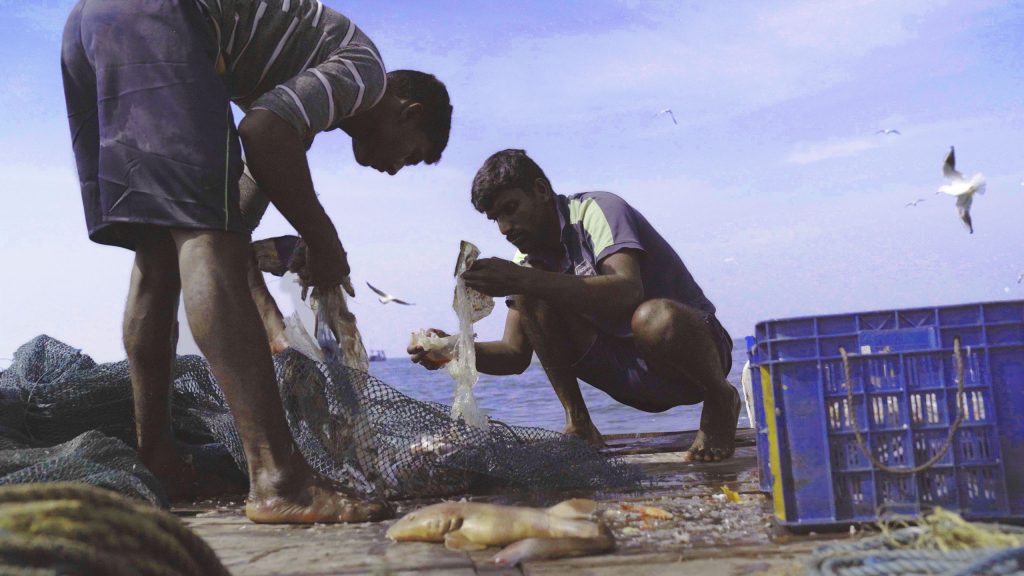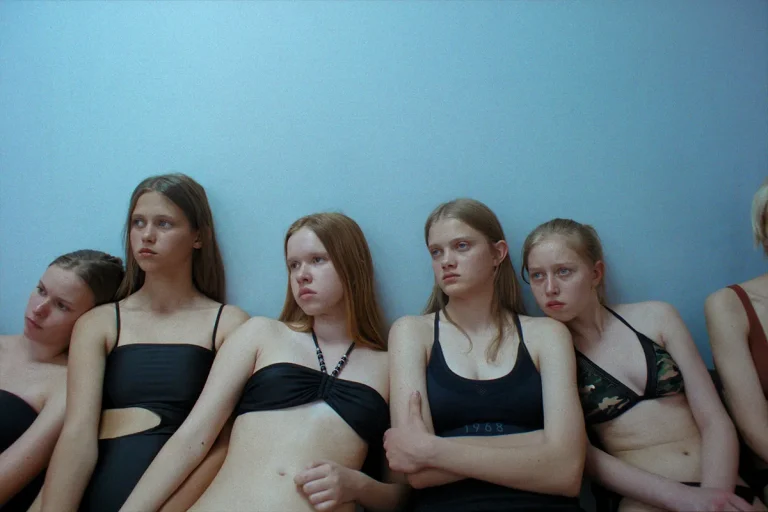Against the Tide (2023): ‘Sundance’ Review – Kolis are a caste group found in the Indian states of Rajasthan, Maharashtra, Himachal Pradesh, Karnataka, Uttar Pradesh, Jammu and Kashmir, Odisha, and Gujrat. Classified as the Other Backward Class by the Government of India, Kolis primarily engages in agricultural activities, while communities inhabiting coastal areas work mostly as fishermen.
In the early 20th century, Kolis were classified as a criminal tribe under the Criminal Tribes Act by the British Colonial Government for their failures to meet revenue demands and their tendency to raid nearby Kanbi villages. The caste group is characterized by its diverse class configuration and professional engagement.
Sarvnik Kaur’s Against the Tide documents the everyday experiences of indigenous Kolis of coastal Maharashtra through a couple of representative protagonists in a highly dynamic world marred by predatory capitalism, geopolitical stress, and a worsening climate that endangers all life.
What makes her work remarkably important is the comprehensive metaphorical structure by virtue of which Against the Tide lays bare the class violence that proves to be fatal for subaltern groups attuned to traditional practices. In addition to the aforementioned, Against the Tide uses an inter-sectional analytical framework to probe into a complex social reality threatened by an environmental collapse due to climate change, in which two people are passively trauma-bonded.
But the dichotomy itself is illusionary as the oppressor himself is oppressed by the system in the global network, and the graded class inequality is a salient feature of capitalism.
The documentary features Rakesh, a humble Koli fisherman who employs his cultural inheritance of traditional fishing methods and the material inheritance of his father’s boat to fish in the shallow sea, supporting his spouse, mother, and newborn. He is friends with Ganesh, a wealthy upper-class fisherman with considerable social and financial capital, who uses modern technology-driven fishing methods in the deep sea, supporting his spouse and serving the expectations of his class.
Rakesh and Ganesh are bonded by caste and, consequently, the inherited work of fishing. While Rakesh aspires to preserve his family and the tradition, Ganesh’s aspiration consists of capital accumulation via his caste occupation. While their class realities differ significantly, they find themselves threatened by collapsing fish stocks.
Fish provides nutrition to at least 3 billion people and is the source of 50% of animal protein intake. Fishing provides livelihood to as many as 500 million people across the globe, and the dependency on fish stocks for food security is more than 50% in developing countries with a coastal line.

Fishing is not only an unsubstitutable means of livelihood but also critical to food security. Globally, fish stocks are under threat from over-fishing, which is disrupting the marine ecosystem. By 2100, the global fish catch is expected to decline by 6% to 11%. FAO classified 34% of all fish stocks as over-fished in 2017.
Over-fishing is a significant problem as not only it leads to resource depletion in certain regions, but it can also lead to critical dispensation that disallows fish populations from sustaining themselves in their ecosystems. Depleting fish stocks has either rendered all methods of fishing profitless or turned them into loss-making ventures. While the catch by traditional methods in shallow water has been reduced to an alarming low due to the predatory practices of bigger boats, the catch in the deep sea is suffering from low volume and by-catch due to invasive fishing by foreign boats.
As foreign boats poach into fish stocks on which indigenous communities depend, bigger indigenous boats find themselves pushed to shallow waters causing a vicious cycle of competition-driven over-fishing. The problem is further exacerbated by the tragedy of the commons arising from the relentless and selfish plundering of an exhaustive common resource pool.
The reality is suffocating as people need their agency or material strength to ensure sustainability and equity. While big fishermen are debt-ridden due to heavy expenditures on fishing expeditions against unprofitable catches, small fishermen barely make ends meet. Against the Tide ensures that all details of this suffocating reality are captured in a manner that portrays everyone as victims of the system without creating a false equivalence between them.
The documentary doesn’t merely capture how two different class groups within the same caste community are impacted by climate change and changing professional modalities; it also ventures into the values inherited from and associated with work traditions. Sarvnik Kaur is patient in her study of the community through her representative subjects to chart a timeline in which the personal and professional dynamics are bound to change.
The subjects are seen responding to the pressures of the industry and familial obligations as they navigate the sea of life. The observational, non-intrusive gaze enables the creation of an empathetic portrait that reveals the dire need for sustainable livelihood alternatives and state intervention in the replenishment of fishing stocks.
The advocacy for solutions is by implication as Ganesh and Rakesh represent their respective class groups in the world of fishermen. Through her documentary, Sarvnik seems to pitch the path developmental pursuits must take. On a macroscopic level, communities need to be protected from invasion into their resource pool. In contrast, on a microscopic level, alternative livelihood channels need to be created without abandoning fishing processes. Solutions become evidently clear from Kaur’s all-encompassing pitch of the problem.
Against the Tide must be admired for the potency of its narrative, which places a community within its socio-ecological reality and essentially establishes how climate change affects all class groups, albeit with varying degrees of intensity. The film generates numerous conversation starters and piques the viewer’s interest in the filmmaker’s methods for creating this account. I sincerely hope it reaches as many people as possible and becomes a fertile ground for discourse.



![The Girl and the Spider [2021]: ‘Berlinale’ Review – A powerfully choreographed exploration of alienation](https://79468c92.delivery.rocketcdn.me/wp-content/uploads/2021/03/The-Girl-and-the-Spider-1-highonfilms-768x463.jpg)

![Yeh Ballet [2020] Netflix Review – A typical underdog tale laden with umteenth cliches](https://79468c92.delivery.rocketcdn.me/wp-content/uploads/2020/02/Yeh-Ballet-Netflix-768x427.jpg)
![Saani Kaayidham [2022] ‘Prime Video’ Review – Keerthy Suresh & Selvaraghavan Led Revenge Saga Is Exhaustively Brutal](https://79468c92.delivery.rocketcdn.me/wp-content/uploads/2022/05/saanikaayitham22042022m2-768x432.jpg)

![The Quiet Family [1998]: One of South Korean Cinema’s Funniest Offerings](https://79468c92.delivery.rocketcdn.me/wp-content/uploads/2018/08/The-Quiet-Family-768x467.jpg)